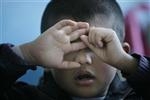 |
 |
 |
||
    |
||||
|
||||

Researchers find first common autism gene
|
|
Reuters Health
Tuesday, April 28, 2009

WASHINGTON (Reuters) - Researchers have found the first common genetic link to autism and said on Tuesday it could potentially account for 15 percent of the disease's cases.
Three studies, two in the journal Nature and one in Molecular Psychiatry, suggest changes in brain connections could underlie some cases.
While the findings do not immediately offer hope for a treatment, they do help explain the underlying causes of the condition, which affects as many as one in 150 children, according to the U.S. Centers for Disease Control and Prevention.
"These findings establish that genetic factors play a strong role in autism spectrum disorder," National Institutes of Health acting director Dr. Raynard Kington said in a statement.
"Detailed analysis of the genes and how they affect brain development is likely to yield better strategies for diagnosing and treating children with autism."
Autism refers to a spectrum of diseases, from severe and profound inability to communicate and mental retardation, to relatively mild symptoms called Asperger's syndrome.
Doctors have been at a loss to explain it, although it has been clear autism can often run in families, suggesting a genetic cause.
"Previous studies have suggested that autism is a developmental disorder resulting from abnormal connections in the brain. These three studies suggest some of the genetic factors which might lead to abnormal connectivity," Dr. Thomas Insel, director of NIH's National Institute of Mental Health, said in a statement.
INTERNATIONAL SEARCH
The international team of researchers looked at DNA from more than 12,000 people, some from families affected by autism, and unaffected volunteers.
"We estimate that the variants we discovered may contribute to as many as 15 percent of autism spectrum disorder cases in a population," Dr. Hakon Hakonarson of Children's Hospital of Philadelphia, who worked on the study, said in a statement.
"Most of the genes that have been identified in these studies are involved in the connections between neurons called synapses,' said Tony Monaco of the Wellcome Trust Center for Human Genetics at Britain's University of Oxford, who worked on the study, said in a statement.
"This does seem to fit with what we know from brain scans -- that people with autism may show different or reduced connectivity between different parts of the brain."
The mutations are not unique to people with autism.
"While this gene variant is common in the general population, we discovered that it occurs about 20 percent more often in children with autism," said Dr. Daniel Geschwind of the University of California Los Angeles, who worked on the study.
"Until now, no common genetic variant has been identified with such overwhelming evidence to support its role in autism spectrum disorders," added Dr. Margaret Pericak-Vance of the University of Miami.
(Editing by Philip Barbara)
Reuters Health
© 2009 Thomson Reuters. All rights reserved. Reuters content is the intellectual property of Thomson Reuters or its third party content providers. Any copying, republication or redistribution of Reuters content, including by framing or similar means, is expressly prohibited without the prior written consent of Thomson Reuters. Thomson Reuters shall not be liable for any errors or delays in content, or for any actions taken in reliance thereon. "Reuters" and the Reuters Logo are trademarks of Thomson Reuters and its affiliated companies. For additional information on other Reuters media services please visit http://about.reuters.com/media/.
Related News:
More News on this Date
Related MedlinePlus Pages:
| Home | Health Topics | Drugs & Supplements | Encyclopedia | Dictionary | News | Directories | Other Resources | |
| Disclaimers | Copyright | Privacy | Accessibility | Quality Guidelines U.S. National Library of Medicine, 8600 Rockville Pike, Bethesda, MD 20894 National Institutes of Health | Department of Health & Human Services |
Date last updated: 29 April 2009 |
